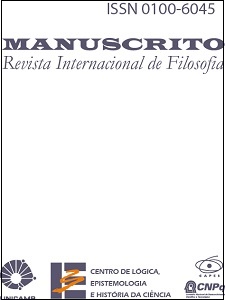Resumen
O objetivo deste artigo é propor uma explicação da noção de conteúdo semântico. Tentarei mostrar que minha explicação tem algumas vantagens sobre as explicações existentes, e, ao mesmo tempo, captura os insights mais importantes por trás das diferentes posições no debate contextualismo-minimalismo. A explicação proposta do conteúdo semântico difere de explicações mais tradicionais por dar mais peso aos parâmetros do ponto de avaliação, deixando pouco no conteúdo ele mesmo. Mesmo no caso de indexicais e de pronomes demonstrativos, o conteúdo semântico é estável através de diferentes contextos e não inclui a referência do pronome. De maneira resumida, o conteúdo semântico associado com (uma enunciação de) uma frase com um ou mais pronomes é uma função que demanda não apenas o mundo e o tempo de avaliação, mas também um ou mais indivíduos, antes de poder fornecer um valor de verdade.
Abstract:
The goal of this paper is to propose an account of the notion of semantic content. I will try to show that my account has some advantages over the existing accounts, and that, at the same time, it captures the most valuable insights behind both parties involved in the contextualism-minimalism debate. The proposed account of semantic content differs from the more traditional ones in that it puts more burden on the parameters of the point of evaluation, leaving very little in the content itself. In particular, even in the case of indexical and demonstrative pronouns, the semantic content is, I suggest, stable across contexts, and does not include the reference of the pronoun. In a nutshell, the semantic content associated with (an utterance of) a sentence that contains one or more pronouns is a function that asks not only for a world and a time of evaluation, but also one or more individuals, before it can return a truth value.
Keywords: Indexicals. Demonstrative pronouns. Content. Contextualism. Minimalism.
Citas
ALMOG, J., WETTSTEIN, H., PERRY, J. (eds.). Themes from Kaplan. New York: Oxford University Press, 1989.
BACH, K. “Seemingly Semantic Intuitions.” In: J. Campbell et al. (eds.) (2002), pp. 21-33.
BIANCHI, C. (ed.). The Semantics/Pragmatics Distinction. Stanford: CSLI Publications, 2005.
BORG, E. Minimal Semantics. Oxford: Oxford University Press, 2004.
CAMPBELL, J. et al. Meaning and Truth. New York: Seven Bridges Press, 2002.
CAPPELEN, H., LEPORE, E. Insensitive Semantics. Oxford: Blackwell, 2005.
CROSSLEY, J., HUMBERSTONE, L. “The Logic of ‘Actually’.” Reports on Mathematical Logic, 8, pp. 11-28, 1977.
FREGE, G. [1918]. “Thoughts”. In: Logical Investigations. Transl. by P. Geach and R. H. Stoothoff. Oxford: Basil Blackwell, pp. 1- 30, 19 KAPLAN, D. “Demonstratives. An Essay on the Semantics, Logic, Metaphysics, and Epistemology of Demonstratives and Other Indexicals”. In: J. Almog, H. Wettstein and J. Perry (eds.) (1989), pp. 481-563.
KANGER, S., OHMAN, S. (eds.). Philosophy and Grammar. Dordrecht: Reidel, 1980.
LEWIS, D. “Index, Context and Content.” In: S. Kanger and S. Ohman (eds.) (1980), pp. 78-100, 1980.
MACFARLANE, J. “Future Contingents and Relative Truth”. The Philosophical Quarterly, 53, pp. 321-36, 2002.
MACFARLANE, J. “Semantic Minimalism and Nonindexical Contextualism”. In: G. Preyer and G. Peter (eds.) (2007), pp. 240-250.
PREDELLI, S. Contexts. Meaning,Truth, and the Use of Language. Oxford: Oxford University Press, 2005.
PREYER, G., PETER, G. (eds.). Context-Sensitivity and Semantic Minimalism. Oxford: Oxford University Press, 2007.
RECANATI, F. Literal Meaning. Cambridge: Cambridge University Press, 2004.
RECANATI, F. Perspectival Thought: a Plea for (Moderate) Relativism. Oxford: Oxford University Press, 2007.
ROTHSCHILD, D., SEGAL, G. “Indexical Predicates”. Forthcoming in Mind and Language, 2009.
STOJANOVIC, I. “Talking about Taste: Disagreement, Implicit Arguments, and Relative Truth.” Linguistics and Philosophy, 30, pp. 691-706, 2007.
STOJANOVIC, I. What Is Said: an Inquiry into Reference, Meaning, and Content. Saarbrucken: VDM Verlag, 2008. 77.
STOJANOVIC, I. (ed.). The Semantics/Pragmatics Distinction. Special issue Synthese, 165, pp. 317-401, 2008.
SZABÓ, Z. (ed.). Semantics vs. Pragmatics. Oxford: Oxford University Press, 2006.
TRAVIS, C. “On what is strictly speaking true”. Canadian Journal of Philosophy, 15, pp. 187-229, 1985.
TURNER, K. (ed.). The Semantics-Pragmatics Interface from Different Points of View. Oxford: Elsevier, 1999.

